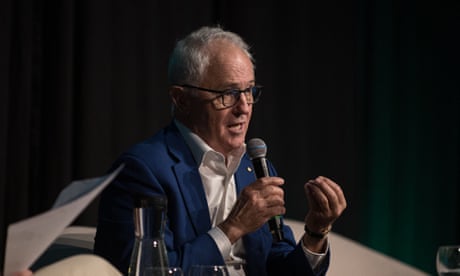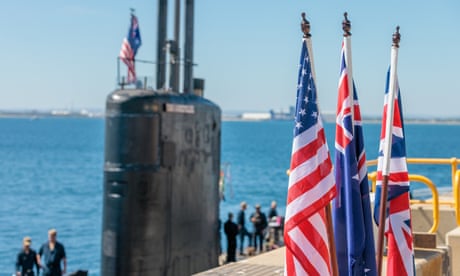US shipyards up to three years behind schedule on submarines as concerns grow for Aukus pact
Greens senator David Shoebridge says review of shipbuilding program ‘adds to the growing list of reasons why Aukus is likely to fall over’
Australia is relying on a US promise to sell it at least three Virginia-class nuclear-powered submarines in the 2030s, prior to Australian-made boats starting to enter into service in the 2040s.
But a report ordered by the US navy secretary, Carlos Del Toro, found the Virginia Block IV program was running about three years late, while the Virginia Block V program was about two years late.
The findings, published this week, will only add to existing concerns about the viability of the plan for Australia to buy at least three Virginia-class submarines to fill a “capability gap” in the 2030s.
It follows revelations last month that the US navy planned to build only one Virginia-class submarine next year.
The pace of construction in the US has an impact on Aukus because the transfer of submarines can only occur after the sitting president certifies to Congress that there will be no degradation of the US’s own undersea capabilities.
Under existing Aukus plans, Australia would buy two secondhand Virginia-class submarines and one new one in the 2030s.
The Congressional Research Service says the boats expected to be sold to Australia in 2032 and 2035 “would be existing boats with 18 to 27 years each of remaining expected service life”.
A third boat, expected to be sold in 2038, “would be a new boat taken directly from the US production line, and thus have a full 33-year expected service life”.
The US navy expects to build additional Virginia-class submarines as replacements for the three sold to Australia.
Officials predict that in order to meet both American and Australian needs, the US has to be building two Virginia-class submarines each year by 2028 and then 2.33 each year after.
The Greens’ defence spokesperson, David Shoebridge, said the latest review of the shipbuilding program “adds to the growing list of reasons why Aukus is likely to fall over”.
“Increasingly the question is when will the Albanese government wave the white flag on Aukus submarines and how many billions more will be lost in the meantime?” he said.
The Australian government has long played down concerns about risks to this part of the Aukus pact, which is also intended to include collaboration on other advanced defence capabilities with the US and the UK.
Ministers have said the strain on US shipyards has been known for some time, and that is why Australia will contribute $US3bn ($A4.5bn) to boost the US industrial base under the plan.
“[Aukus] is entirely factored into how America is now thinking about their own construction of Virginia-class submarines,” the defence minister, Richard Marles, told the ABC’s Insiders program late last month.
“And we knew that the production rate needed to be increased in the US, which is why we’re making the contributions that we’re making.”
Marles said in a speech on Thursday evening that Aukus was progressing “at pace”.
“While many said it would never happen, the US has delivered the legislation to enable the transfer to Australia of both nuclear-powered submarines and importantly know-how,” he told the Sydney Institute.
Asked whether the deal would survive a potential return to the White House of Donald Trump, Marles confirmed the government was thinking about “whatever contingencies might arise post-November”.
But he said the Aukus legislation had won support from across the US political spectrum, including from Republicans who supported Trump.
“What gives us a sense of real confidence that Aukus will survive the journey, I think, is fundamentally that it’s in the strategic interests of the three countries.”
The comments came after the US deputy secretary of state, Kurt Campbell, made a rare linkage between Aukus and the fate of self-governed Taiwan, which Beijing has not ruled out taking by force.
Campbell told the Center for a New American Security thinktank that the submarine capabilities would “have enormous implications in a variety of scenarios, including in cross-strait circumstances”.
“I would argue that working closely with other nations, not just diplomatically but in defence avenues, has the consequence of strengthening peace and stability more generally,” he added.
China has repeatedly labelled the Aukus pact as a dangerous initiative that would only fuel regional tensions.


No comments:
Post a Comment